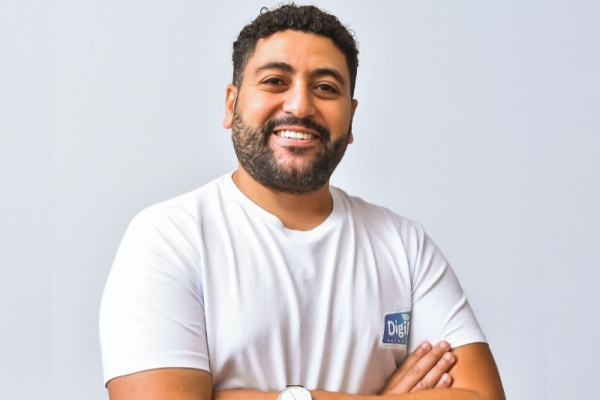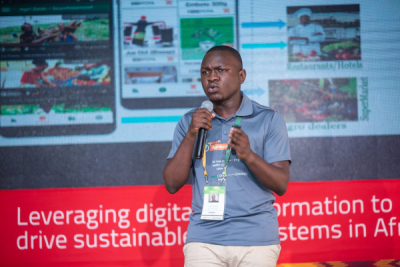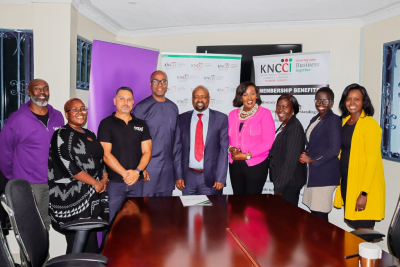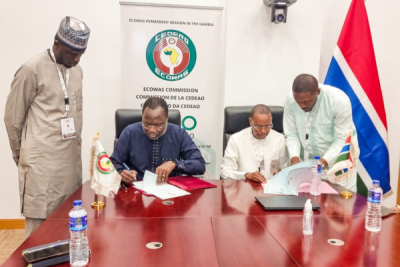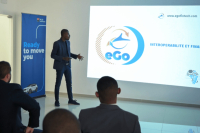Present in Burkina Faso, Mali, Niger, Togo, Benin, Côte d'Ivoire, Senegal, and Guinea, this fintech solution is rapidly expanding. The goal is to establish itself as a continental benchmark.
LigdiCash is a fintech solution developed by a Burkinabe start-up. It enables users to access a variety of financial services through its web and mobile platforms. Based in Bobo Dioulasso, the startup was founded by Souleymane Traoré.
"The idea was born from the observation that many entrepreneurs, companies, and e-commerce merchants were struggling to find an online payment method for the websites and apps they had developed for their clients," Souleymane Traoré told Croissance Afrique in 2022.
The solution features a mobile app available on iOS and Android –the Android app has already been downloaded over 100,000 times, according to Play Store statistics. After downloading, users must create an account to access the fintech's services. Individuals can, among other things, have an electronic wallet from which they can conduct transactions such as mobile money transfers to various telecom networks, purchase airtime and internet bundles, or make online payments.
For businesses, the fintech offers tailored services to help them grow. It provides an API for online payments via various methods such as credit cards (Visa, Mastercard, American Express, etc.) or mobile money. The Bulk feature allows for transactions like salary or supplier payments to be made in one go using the aforementioned payment methods.
PayLink enables the creation of a payment link through which the user can receive online payments for online sales or fundraising campaigns. "When a merchant uses PayLinks, they publish their items with a link or button next to them. The client can click on it and make a payment if interested in that particular item, and the merchant will be notified of the purchase," explains the startup.
Adoni Conrad Quenum
He champions agent independence by providing them with resources that free up their time and boost their bottom line. Thousands of agents have already benefited from his approach.
Ahmed Nassef (photo), an Egyptian entrepreneur, co-founded and currently serves as the CEO of LeadsMart. This startup, which targets real estate sales employees, brokerage firms, and developers, facilitates advertising campaigns on social platforms.
Established in 2019, LeadsMart is on a mission to transform the real estate sector through AI-assisted lead generation. The platform empowers real estate professionals to swiftly launch advertising campaigns on social networks, thereby streamlining lead generation. With a diverse range of visuals and content customized for each project, users can execute effective campaigns.
LeadsMart distinguishes itself by offering clients real-time campaign statistics, allowing them to monitor costs and modify strategies as needed. Furthermore, the startup provides users with access to a network of real estate professionals, investors, and industry leaders. Since its inception, LeadsMart has developed over 600 projects, generated more than 20,000 leads, and supported over 1,300 sales agents.
In addition to his role at LeadsMart, Nassef is a mentor at the Founder Institute accelerator in Egypt and a partner at Joud Investment, a group of experts specializing in delivering integrated commercial real estate services to investors, buyers, and tenants.
In 2013, Nassef co-founded Fabrica Creative Studio, a startup that offers comprehensive and professional marketing services to industries aiming to attract specific clients and generate more leads. He served as its CTO from 2013 to 2019.
Nassef earned a degree in business administration from Ain Shams University in 2013. Prior to embarking on his entrepreneurial journey, he worked as a system engineer at Unilever Foodsolutions from 2009 to 2010.
Melchior Koba
He has over 12 years of experience in software development. He has created and developed several technological solutions aimed at supporting the workforce in Africa.
Steve Ndende (photo), a Congolese entrepreneur and computer scientist, is the founder and CEO of Agri Zoom, a platform launched to provide farmers with access to loans and a marketplace for selling their products.
Launched in 2018, Agri Zoom offers a crowdfunding system for farmers, fishers, and processors of agricultural products. Its online marketplace simplifies the sale of crops, allowing farmers to concentrate on production.
In addition to Agri Zoom, Ndende is the founder and CEO of MboteShop, an e-commerce platform that operates in the Republic of Congo, the Democratic Republic of Congo, Gabon, and Cameroon. Launched in 2021, MboteShop is one of Ndende’s many entrepreneurial ventures.
Ndende is also the founder and a web developer at Essengo Solutions, a digital communication and software development agency. Established in 2023, Essengo Solutions supports companies and individuals in their digital transformation.
The entrepreneur has a robust professional background. He earned a degree in software engineering from Ecole africaine de développement in Brazzaville in 2015 and a professional diploma in entrepreneurial studies from the University of Iowa in 2019. Before founding his own companies, he served as the technical director at Eyano until 2022 and co-founded Ndende Lab in 2017, where he worked as a developer until 2022.
In addition to his entrepreneurial activities, Ndende was an active contributor to the Fongwama open-source development community from 2015 to 2018. He also served as a trainer and speaker at JCertif International, a non-profit organization that organizes training and events in IT and communication technology, from 2015 to 2022.
Ndende’s commitment and professional achievements have been recognized on multiple occasions. In 2018, he won first prize in the FAO’s global challenge “My Food My Future.” In 2019, his start-up Agri Zoom was selected as one of the Top 1000 Entrepreneurs by the Tony Elumelu Foundation.
Melchior Koba
At the 2nd Digital Entrepreneurship and Artificial Intelligence Fair in May 2023, the Benin government unveiled its project for an AI-based conversational.
Benin is embarking on a project to develop artificial intelligence (AI) systems that prioritize local languages. This collaborative effort brings together the Information and Digital Systems Agency (ASIN),the Ministry of Digital Affairs and Digitalization, Sèmè City, and iSHEERO, a group specializing in data science and AI expertise.
The data collection phase for local languages was launched on Wednesday, May 8th and the gathered information will be used to train large language models (LLMs) powered by AI.
This national initiative aligns with Benin's National Strategy for Artificial Intelligence and Big Data, adopted in January 2023. The strategy aims to harness the potential of AI in various sectors, including education, healthcare, agriculture, and tourism. Additionally, it seeks to position Benin as a leader in AI development within West Africa.
A March 2024 report, "AI and the Future of Government: Unexpected Effects and Critical Challenges", published by the Moroccan think tank Policy Paper, highlights the challenges faced by countries with limited language data when implementing AI models. Benin falls into this category, and this participatory campaign aims to address the potential digital divide arising from AI applications.
"The efficacy of these AI technologies hinges on the availability and quality of data, requiring datasets (corpus) that are not only extensive but also diverse and representative, to ensure their applicability across a wide spectrum of languages and contexts," the report emphasizes.
Adoni Conrad Quenum
Digital solutions tailored for MSMEs can empower businesses across Africa to leverage online platforms, expand their market reach, and drive economic growth by creating job opportunities and fostering entrepreneurship.
Tappi has partnered with the Kenya National Chamber of Commerce and Industry (KNCCI) to launch the Sukuma Biz initiative.
The initiative, announced on May 2, is set to provide tailored digital services to KNCCI’s 30,000 business members to enhance their online credibility and identity. This digital commerce solution for Micro, Small, and Medium Enterprises (MSMEs) enables business owners to easily customize their online presence through a user-friendly app, seamlessly integrating with Google Ads, Facebook Ads, and Instagram Ads using airtime credit or mobile money.
“KNCCI is one of Kenya’s most trusted industry bodies and with its extensive network of local businesses, they’re an ideal partner to accelerate our mission of empowering MSMEs to effectively establish strong reputations of their own in an online setting,” said Griffith.
For a monthly fee of KES500 (US$4), KNCCI members gain exclusive benefits, including a personalized business landing page on tappi’s platform adorned with the KNCCI logo. Members also receive 50 customer reviews via SMS, WhatsApp, or other channels, seamlessly integrated into their landing page, and can send 250 text marketing messages directly to their customers.
Using tappi’s SaaS solutions, KNCCI members can swiftly generate SEO-optimized websites within minutes, guided by an intuitive chat tool. Leveraging AI, machine learning, and algorithms, each website's content and design will be tailored to its target audience and industry sector. Members can also distribute Google, Facebook, and Instagram ads effortlessly and access a range of supplementary digital services.
With Kenya positioned as the 74th largest market for eCommerce, boasting a predicted revenue of US$801.4 million by 2024, according to the ECDB (European Company Database), initiatives like Sukuma Biz are well-placed to capitalize on this growing market. This statistic underscores the potential for tappi's tailored digital services to empower MSMEs in Kenya and contribute to the country's economic development and digital growth.
Hikmatu Bilali
The Gambia has made significant progress in its digital transformation journey. To advance even further, the country is receiving support from the organizations it belongs to, such as ECOWAS.
The President of the Economic Community of West African States (ECOWAS) Commission, Omar Alieu Touray, and the Gambian Minister of Digital Economy, Ousman A. Bah, signed a grant agreement on Friday, May 3, during the 15th Summit of the Organization of Islamic Cooperation (OIC).
This $180,000 grant aims to strengthen The Gambia's digital infrastructure and enhance the country's governance through new technologies.
This initiative is part of an ECOWAS strategy to strengthen the digital capabilities of all its member states. It comes at a time when The Gambia is intensifying its efforts to accelerate digital transformation and improve telecommunications infrastructure to provide its population with innovative new services.
Currently, the country is working on a comprehensive digital strategy set to launch in the coming months. Additionally, The Gambia is preparing to connect to a second international fiber optic submarine cable, funded by the World Bank at a cost of $30 to $35 million. The government is also considering enhancing national connectivity via satellites.
The ECOWAS grant is expected to support the implementation of this strategy, which includes digitizing administrative services, improving citizens' digital skills, and creating a standardized digital identification system, among other initiatives.
Samira Njoya
Fintech solutions are multiplying across the continent to address various financial service issues. In Togo, a startup has focused on mobile money interoperability and offers a solution in this regard.
eGo Transfer, a fintech solution developed by a startup in Togo, enables users to send and receive money via mobile, irrespective of their telecom provider. The startup, headquartered in Lomé, was established in 2020 by Attisso Luz Koumedzro.
"The inspiration for eGo Transfer came when my younger brother asked me to send him money via Flooz, but I was using T-Money. So, I conceived eGo Transfer, which facilitates money transfers from T-Money to Flooz and vice versa. It also allows for money received from Ria to be deposited into T-Money or Flooz accounts," Koumedzro explained.
The solution includes a mobile app for Android smartphones, which can be downloaded from the eGo Transfer website, although it is not available on the Play Store. After downloading, users create an account by providing details such as their first and last names, phone number, and a six-digit PIN code.
Once the account is set up, users can transfer funds to any telecom network operating in Togo. Within the app's interface, users simply select the network they want to transfer from and to, enter the amount, phone number, and PIN code to confirm the transfer. Transfers via this mobile app require a minimum of 300 CFA francs (approximately $0.49).
In 2020, eGo Transfer won the first prize at the Open Hack organized by the Nunya Lab incubator. The aim was to propose an innovative solution, and eGo Transfer captured the jury's attention, walking away with a check for one million CFA francs. In 2023, the fintech, along with seven other Togolese startups, was selected to participate in the Tech Africa-Europe International Summit, Emerging Valley, held on November 27-28 in Marseille, France.
Adoni Conrad Quenum
A robotics and artificial intelligence expert, he's made a name for himself by designing drones and AI solutions. Now, he's a major player in both continental and global technological advancements.
William Elong (photo) is a Cameroonian entrepreneur and business leader. As the founder and CEO of Faraday, he applies his expertise and knowledge in artificial intelligence to serve everyone, developing open-source AI and cybersecurity solutions.
Faraday, a startup based in France and Belgium, specializes in AI, fintech, and cybersecurity solutions. Its flagship product, Ares Chat, is a collaborative platform that allows users to share files, communicate with their team, and interact with AI within a secure ecosystem.
Faraday's solution offers a unique ecosystem that includes a browser, a chat model connected to the user's banking services, and a web search feature. Another product from the startup, Ares Creative, enables image generation to stimulate users' creativity.
In addition to Faraday, William Elong has been the founder and CEO of Will & Brothers Consulting since 2014, providing IT innovation and consulting services worldwide. In 2018, he founded Algo Drone Holding, focused on developing drone and AI solutions, where he also serves as CEO.
As a serial entrepreneur, he founded Cameroon Flying Lab in 2018. Affiliated with We Robotics Organization, the Cameroon Flying Lab is an initiative promoting drones, robotics, and STEM (science, technology, engineering, and mathematics) for youth empowerment.
In 2019, William also established the Developers Institute Center, a training center for young developers in Cameroon. He holds a master's degree in Strategy and Competitive Intelligence from the School of Economic Warfare in France, obtained in 2013. Before embarking on entrepreneurship, he gained experience working in various companies.
He worked for Thales Information Systems as an IT specialist and IT project manager from 2011 to 2012. Between 2013 and 2014, he was a sales engineer at Oracle.
Recognized for his achievements, William Elong was ranked among Forbes Africa's 30 Most Promising Young Entrepreneurs Under 30 in 2016.
Melchior Koba
Healthtech is one of the most sought-after segments in the tech sector. Solutions are emerging from all corners to simplify daily life for African populations.
PharMap, a healthtech solution developed by a Beninese startup, allows users to locate and order medications online in less than ten minutes. The startup, co-founded by Anourah Mazu in 2021, aims to streamline access to high-quality medications in Africa, with a particular focus on Benin.
The startup explains, “In Africa, a patient may have to visit over 15 different pharmacies before finding a needed medication. This often leads to the use of counterfeit drugs, resulting in medical complications, or even worse, fatalities. We’re creating the first system that enables you to locate the nearest pharmacies that stock the medications you need.”
To accomplish its mission, PharMap utilizes a mobile app, available on iOS and Android. The Android app has been downloaded over 10,000 times according to Play Store statistics. It also uses the WhatsApp messaging application. After downloading the mobile app, users need to create an account to access services such as "Trouver un médicament (Find a Medication)" and "Trouver une pharmacie (Find a Pharmacy)."
The “Find a Medication” feature enables users to check the availability and price of a medication at nearby pharmacies based on their location. Users can either type the name of the medication into the search bar or send a photo of the prescription. The “Find a Pharmacy” service helps users locate pharmacies in a specific geographical area or those nearest to their current location.
Users can also order medications directly from pharmacies via the app’s interface, make an online payment, and then pick up their order at the pharmacy. For PharMap’s service via WhatsApp, users simply need to save the healthtech’s number and send their request via message. They will receive a response to their query in less than ten minutes, according to the startup.
Adoni Conrad Quenum
The solution was developed to streamline meal deliveries in Nigerian cities. It notably focuses on secondary cities.
Chowopa, a Nigerian startup, has developed a last-mile delivery solution that allows users to order food from their favorite restaurants and have it delivered straight to their homes or offices. The startup was founded in 2022 by Umebe Anthony and Umoru-Musa Abdullahi and is headquartered in Akure, a city in Ondo State.
The Chowopa solution is accessible through a mobile app, available on both iOS and Android platforms. After installing the app, users can create an account by entering their personal details. Once registered, they can place orders from a variety of partner restaurants listed on the platform.
The app allows users to search for restaurants based on location, type of cuisine, or customer ratings. Users can input a specific location within a city or state in the search bar to find restaurants that cater to that area. They also have the option to select a particular type of cuisine, such as African, fast food, Indian, and more. Customer reviews are available to help users choose between restaurants. After their meal is delivered, Chowopa encourages users to rate the service based on the quality of the food and the speed of delivery. Users can also leave comments to provide feedback on their experience.
Restaurants interested in joining the platform can do so by clicking on the "Sell on Chowopa" button and following the registration process. They will be asked to provide details such as the restaurant's name, the owner's name, email address, and phone number.
Adoni Conrad Quenum
More...
Her goal is to simplify the lives of business leaders in Tanzania. Her dedication has been recognized and celebrated by Forbes Africa.
Tanzanian native Prisca Magori (photo) is the co-founder and CEO of Smart EFD, a startup that empowers businesses and corporations to create tax invoices that adhere to local laws and regulations.
Established in 2022, Smart EFD provides a tech-based solution for generating tax receipts from a variety of devices, including smartphones, laptops, point-of-sale terminals, and desktop computers. These receipts can be verified using QR codes, in line with the regulations of the Tanzania Revenue Authority (TRA).
Smart EFD is a service offered by the Tanzanian firm, Evas Autotravel Company Ltd. The solution was developed by TenTen Inc Ltd, a company that Prisca Magori co-founded in 2021. TenTen Inc Ltd, where Magori served as CEO until 2022, operates in the tourism industry, providing an innovative platform for booking immersive travel experiences with flexible payment options.
The CEO earned her petroleum engineering degree from the China University of Petroleum in 2018. She also holds a master's degree in project management from the University of Dar es Salaam, which she received in 2022.
She started her professional journey as an intern at Shengli Oilfield Services Co. in 2017. The following year, she joined the Engineers Registration Board Tanzania as a junior engineer. In 2019, she took on the role of coordinator for the Construction Sector Skills Council at the Tanzania Private Sector Foundation.
In April 2024, Prisca Magori was recognized on the Forbes Africa 30 Under 30 list, an honor given to young entrepreneurs under 30 who are making significant contributions to the development of the continent.
Melchior Koba
A serial entrepreneur, he is the creator of several technological solutions that particularly assist businesses. His goal is to help companies better manage their activities and increase their profits.
Kenyan entrepreneur Stephen Nyumba (photo) is the co-founder and CEO of PokeaPay, a company that offers a comprehensive customer management and payment processing solution. This platform acts as a payment gateway for East Africa, simplifying financial transactions.
Established in 2020, PokeaPay is dedicated to providing customized and innovative solutions to support its clients’ growth. Besides facilitating payments, it assists businesses in enhancing customer interactions and improving the quality of sales. It also equips them with valuable data for making more informed strategic decisions.
PokeaPay supports its clients throughout every stage, from customer acquisition to payment completion, including conversion and sales. It accepts a variety of payment methods, including VISA, MasterCard, M-Pesa, Airtel Money, and Pokea Wallet.
Stephen Nyumba’s contributions extend beyond PokeaPay. The tech entrepreneur has a wealth of experience in technology. In 2004, he co-founded Intrepid Data Systems, a company that specializes in productivity solutions for businesses. He also established the Local Development Research Institute in 2015, an action-oriented think tank aimed at eradicating poverty, hunger, and inequality in Africa.
In 2010, he co-founded iPay Limited, a startup that offers real-time payment processing and billing services, licensed by the Central Bank of Kenya.
Stephen Nyumba earned his Bachelor’s degree in Information Technology from Jomo Kenyatta University of Agriculture and Technology in 2007. He embarked on his professional career in 2002 as an IT Administrator at Centurion Systems, a center for training and technology transfer.
Melchior Koba
The entry of major e-commerce players into African markets will ignite competition, innovation, and investment in the digital economy, leading to improved online access, job creation, and greater prospects for local businesses. This will play a significant role in fostering digital growth and economic development across the continent.
E-commerce giant, Amazon.com Inc., has launched Amazon.co.za in South Africa, today May 7.
“We are excited to launch Amazon.co.za, along with thousands of independent sellers in South Africa. We provide customers with great value, broad selection including international and local products and a convenient delivery experience," said Managing Director of Amazon Sub-Saharan Africa, Robert Koen, in an Amazon statement.
Following last October’s announcement to expand into the region, the platform offers a wide product range from local and international brands. Customers can access Amazon.co.za via the Amazon Shopping App or browsers, with fast delivery options and 3,000 pickup points.
The launch enables local businesses to reach a wider customer base, featuring South African brands alongside international ones.
Amazon reveals that more than 60% of sales in Amazon’s stores globally are from independent sellers—most of which are small and medium-sized businesses. This underscores the potential for leveraging digital platforms to drive economic growth in Africa and create jobs, as it highlights the significant contribution of independent sellers, primarily small and medium-sized businesses, to overall sales.
By providing opportunities for businesses to thrive on digital platforms, there is the potential to stimulate economic activity, foster entrepreneurship, and generate employment opportunities across the continent.
Hikmatu Bilali
“Every May, we commemorate Africa Month, marking a time when the colours of African heritage and the bright promise of its future are brought to the forefront through vibrant celebrations. This year, we're thrilled to partner with the African Union to amplify these celebrations, inviting the world to #DiscoverMyAfrica through the power of YouTube Shorts,” Google reveals
“The #DiscoverMyAfrica Challenge is part of the African Union’s collaborative effort in driving innovation through strategic partnership with Google, through the Office of the Youth Envoy, Make Africa Digital (MAD) initiative,” an AU release, dated May 2, states.
This initiative celebrates Africa's diversity and heritage, empowering youth to share their stories globally. The challenge covers various aspects of African life, including music, art, food, fashion, and landmarks.
Hikmatu Bilali



